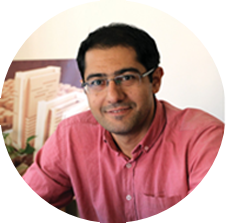
Yaser Tahamtani Ph.D.
Department of Stem Cells and Developmental Biology
Assistant professor
Yaser Tahamtani earned his B. Sc. from Shiraz university, Shiraz, Iran in 2003 and his M. Sc. and PhD from khawarizmi University, Tehran, Iran in 2006 and 2012, respectively. He joined Royan Institute in 2009 and started his thesis on endoderm formation from human embryonic stem cells. His main interest is on endoderm, pancreas and differentiation of pluripotent stem cells to pancreatic endocrine cells.
Defects in the pancreatic beta cells can cause type I diabetes which has affected millions of people around the world. Today, along with common treatment (such as insulin therapy) various cell therapy methods have been developed to attempt a definitive cure for this disease. Having the national health needs in mind, the Pancreatic Beta cells research team has been active since 2006 and has expanded its activities towards two fields:
1) Studying the production and regeneration of pancreatic beta cells
In this field, research is done on regenerating beta cells that are lost due to diabetes. Among the approaches used in this field are the yielding of insulin-secreting cells from embryonic stem cells. Other research approaches in this field include:
a. Manipulating major differentiation signaling pathways to optimize endoderm formation and insulin-secreting cell production from embryonic stem cells using growth factors and small molecules in adherent cell culture and suspension cell culture.
b. Harnessing engineering approaches to improve pluripotent stem cell development to endodermal and pancreatic cell fates.
c. Forced expression of transcription factors involved in pancreas development aiming to improve the differentiation of embryonic stem cells to insulin secreting cells.
d. Production of transgenic embryonic stem cell lines containing reporter genes as a useful tool to study differentiation.
e. Screening herbal drugs effective on pancreatic beta cell regeneration using transgenic zebra fish as model organism.
f. Producing structures similar to pancreatic embryonic buds from pancreatic progenitor cells, endothelial cells and mesenchymal cells derived from bone marrow by self-organization.
2) Translational research and clinical trial
Researchers and practitioners active in this field are studying the potential diabetes treatments which can be used in near future. This team designs and installs clinical trials in collaboration with various other health centers in the country. Some research approaches in this field include:
a. Co-grafting the pancreatic islands and transgenic mesenchymal stem cells expressing VEGF in order to induce angiogenesis after grading island cells (Lack of prompt angiogenesis at the time of grafting is an obstacle).
b. Producing oxygen release microspheres to tag along pancreatic island cells at the time of grafting. (Lack of oxygen at the time of grafting is another obstacle).
c. Encapsulating pancreatic islands with microcapsules made from alginate as a method of immunizing pancreatic islands against host immune system.
d. Two clinical trials are being undertaken in this field
d1. Clinical trial (phase I) for grafting pancreatic island cells to patients with diabetes type I (brittle diabetes).
d2. Clinical trial (phase I) for grafting mesenchymal stem cells with a GLP1 agonist drug to patients recently diagnosed with diabetes type I.
MSc Students:

Fatemeh Karami (M.Sc.)

Maedeh Khalaj (M.Sc.)
PhD Students:

Zahra Ghezel Ayagh (Ph.D.)

Isan Farhadi (Ph.D.)
Selected Publications:
- Basiri M1, Behmanesh M2, Tahamtani Y3, Khalooghi K3, Moradmand A3, Baharvand H4. The Convenience of Single Homology Arm Donor DNA and CRISPR/Cas9-Nickase for Targeted Insertion of Long DNA Fragment. Cell J. 2017 Winter;18(4):532-539. Epub 2016 Sep 26
- Mokhber Dezfouli MR, Chaleshtori SS1, Dehghan MM, Tavanaeimanesh H, Baharvand H, Tahamtani Y. The Therapeutic Potential of Differentiated Lung Cells from Embryonic Stem Cells in Lung Diseases. Curr Stem Cell Res Ther. 2017;12(1):80-84
